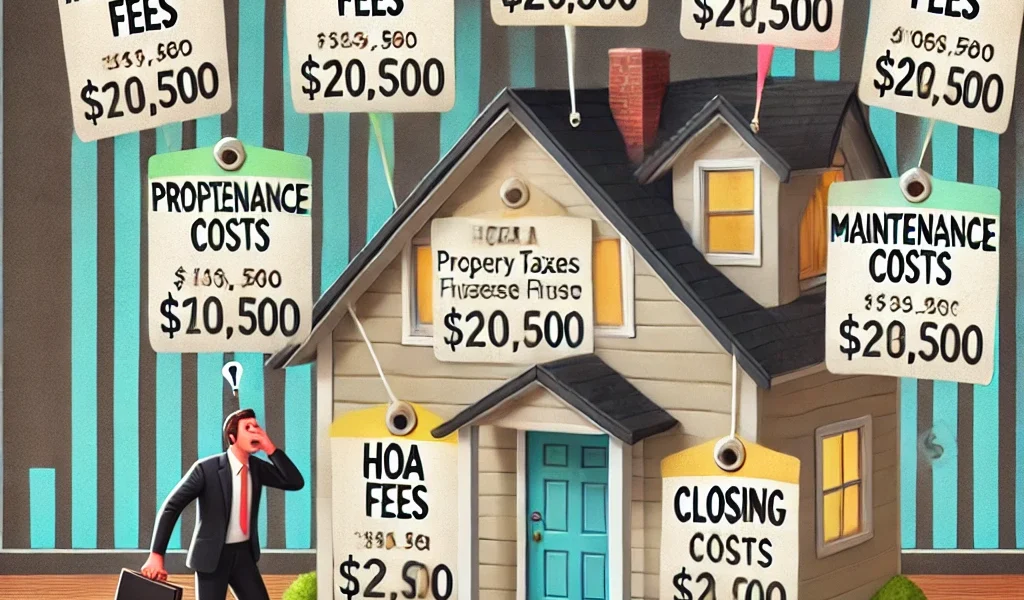Introduction
Investing in real estate can be a lucrative endeavor, but many buyers focus only on the purchase price and overlook hidden costs that can significantly impact their finances. These unexpected expenses can arise before, during, and after the purchase process, affecting overall returns on investment.
This DIY guide explores the various hidden costs in real estate investment, helping buyers and investors make informed financial decisions. Understanding these costs in advance can prevent surprises and ensure a smooth investment journey.
1. Pre-Purchase Hidden Costs
1.1 Property Inspection Fees
Before buying a property, a thorough home inspection is crucial to identify structural issues, plumbing problems, electrical faults, or pest infestations. Professional inspections typically cost between $300 to $800, depending on the property’s size and location.
1.2 Legal & Documentation Fees
Hiring a real estate attorney or legal expert to review contracts and agreements ensures compliance with laws. Legal fees can range from $1,000 to $5,000, depending on the complexity of the deal.
1.3 Title Search & Insurance
- A title search ensures that the property has no legal disputes or liens. This typically costs $100 to $500.
- Title insurance protects against future claims on property ownership and can range from $500 to $2,000.
1.4 Loan Processing & Mortgage Fees
If financing the purchase through a mortgage, expect the following:
- Loan origination fees: 0.5% to 1% of the loan amount.
- Credit report fees: $25 to $50.
- Appraisal fees: $300 to $600.
These fees add up, increasing the total borrowing cost.
2. Hidden Costs During Purchase
2.1 Closing Costs
Closing costs cover various administrative expenses and range between 2% to 5% of the property price. These include:
- Escrow fees
- Notary charges
- Transfer taxes
- Recording fees
2.2 Property Taxes
Many buyers underestimate property taxes, which vary based on location and assessed property value. Some states have high tax rates that can impact cash flow.
2.3 Homeowners Association (HOA) Fees
If investing in a condo or gated community, monthly HOA fees may apply, ranging from $200 to $1,000+ per month, depending on amenities and maintenance costs.
2.4 Insurance Costs
- Homeowners Insurance: Required by lenders, costing $500 to $2,500 per year.
- Flood or Earthquake Insurance: Additional coverage for high-risk areas, increasing annual expenses.
3. Post-Purchase Hidden Costs
3.1 Repair & Maintenance Costs
Unexpected repairs and ongoing maintenance are common. Set aside 1% to 3% of the property’s value annually for upkeep, covering:
- Roof repairs
- HVAC system maintenance
- Plumbing and electrical fixes
- Landscaping
3.2 Utility Bills & Services
Monthly utility bills include electricity, water, gas, and trash collection. High-end properties with smart home features may have increased energy costs.
3.3 Vacancy & Property Management Fees
For rental property investors:
- Vacancy periods mean covering mortgage and expenses without rental income.
- Property management fees range from 8% to 12% of rental income for professional services.
3.4 Renovation & Customization Costs
Many buyers invest in renovations to increase property value. Kitchen remodeling, bathroom upgrades, and landscaping can cost thousands of dollars, affecting short-term cash flow.
4. Long-Term Financial Considerations
4.1 Depreciation & Wear-and-Tear
Over time, real estate assets face depreciation, requiring reinvestment in upgrades and repairs to maintain market value.
4.2 Capital Gains Tax (If Selling the Property)
When selling a property, capital gains tax may apply on profits. In the U.S., long-term capital gains range from 0% to 20%, depending on income and holding period.
4.3 Refinancing & Loan Adjustment Costs
Refinancing a mortgage to secure a lower interest rate may include closing costs, prepayment penalties, and loan origination fees.
DIY Tips to Manage Hidden Costs
✅ Budget for Unexpected Expenses – Set aside at least 5% of the property value for unforeseen costs. ✅ Negotiate Closing Costs – Some fees can be negotiated or shared with the seller. ✅ Invest in Property Insurance – Protect against potential losses from disasters or legal claims. ✅ Perform Thorough Due Diligence – Research property history, local tax rates, and HOA regulations before purchase. ✅ Plan for Long-Term Maintenance – Regular inspections and preventive maintenance reduce costly repairs.
Conclusion
Real estate investment can be profitable, but hidden costs can erode potential gains if not accounted for. By understanding these expenses before, during, and after purchase, investors can make better financial decisions and maximize returns.
A well-planned approach, thorough research, and financial preparedness can help avoid surprises and ensure a successful real estate investment.




